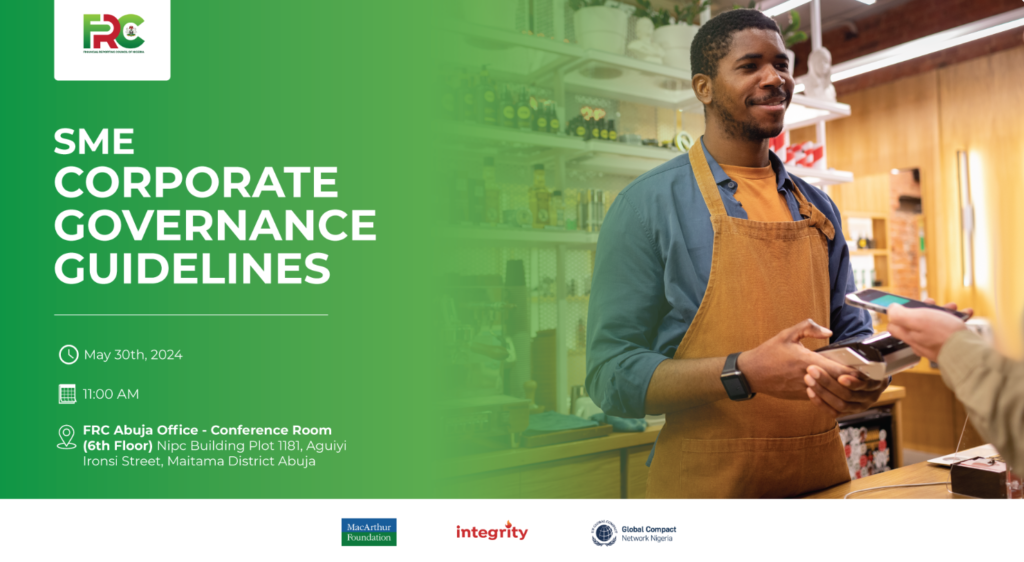Abuja, Nigeria, May 24, 2024 – The Financial Reporting Council of Nigeria (FRC), in collaboration with the Integrity Organisation and the UN Global Compact Network Nigeria, is pleased to announce the forthcoming issuance of the Small and Medium Enterprises Corporate Governance Guidelines (SME-CGG). This momentous event will take place at the FRC office in Abuja on Thursday, May 30, 2024.
Building on the collaboration between FRC, IO, and UN Global Compact Network Nigeria, since 2022 on the “SME Future-Forward Project,” funded by the MacArthur Foundation, the SME Corporate Governance Guidelines have been meticulously developed to address the unique governance needs of Micro, Small, and Medium Enterprises (MSMEs) in Nigeria. The Guidelines aim to enhance transparency, accountability, and performance within the sector, thereby increasing MSMEs’ capacity to strengthen governance practices, foster stakeholder trust, and facilitate access to finance for sustainable economic growth. The Guidelines also provides a framework that enables SMEs to strengthen their business practices, address regulatory risks, and survive Nigeria’s harsh, unpredictable business environment today and in the future.
The organisations had previously held numerous stakeholder consultations with the private sector, business membership organisations (BMOs), and government agencies to discuss the guidelines, gather feedback, and plan for the institutionalisation of corporate governance best practices in SMEs, which constitute 96% of all Nigerian businesses. Feedback and recommendations from key stakeholders were adopted to refine the final version of the SME-CGG.
Executive Secretary/CEO, FRC, Dr. Rabiu Olowo, states that “by adopting these guidelines, SMEs will be better positioned to attract investment, build trust with stakeholders, and enhance their competitive edge. Good corporate governance is not merely about compliance; it is about fostering a culture of ethical behaviour, sound decision-making, and long-term sustainability. It is about creating businesses that are not only profitable but also contribute positively to society. We at the Council eagerly look forward to witnessing the remarkable achievements that will undoubtedly arise from this initiative.”
“This initiative for small and medium enterprises establishes a code of corporate governance with guidelines that are not mandatory, but rather adopted by companies due to the incentives they will receive, enabling them to better contribute to national sustainable growth,” remarked Soji Apampa, CEO of Integrity Organisation.
“Although small and medium-sized enterprises (SMEs) face greater barriers than large companies, they often provide essential services and products in the supply chains of larger companies and account for more than 50% of employment worldwide. Creating opportunities for SMEs is a key way to advance social and economic development in line with the Sustainable Development Goals (SDGs). These guidelines help SMEs incorporate sustainability into their business strategies and represent our firm commitment to the sustainability of Nigeria’s SMEs,” said Naomi Nwokolo, Executive Director, UN Global Compact Network Nigeria.
The unveiling ceremony will feature prominent stakeholders from various sectors, including government officials, business leaders, industry experts, and representatives from MSMEs. Attendees will gain valuable insights into the guidelines and their expected impact on the Nigerian economy.
About the UN Global Compact Network Nigeria
The UN Global Compact Network Nigeria is one of the 78 Country Networks of the United Nations Global Compact, the world’s largest corporate sustainability initiative. Guided by The Ten Principles and the 17 SDGs, we support companies and stakeholders in understanding what responsible business means within a global and local context, and provide guidance to translate sustainability commitments into action. The UN Global Compact Network Nigeria stimulates and facilitates the creation of local connections and serves as a catalyst for companies and stakeholders to achieve Agenda 2030. For more information, visit us at www.unglobalcompactng.org.
About FRC
The Financial Reporting Council is a government agency whose mandate is to develop, publish, and regulate public interest entities’ accounting and financial reporting standards. Beyond their technical and regulatory function in accounting and auditing matters, the FRC works to ensure good corporate governance practices in the public and private sectors, protect investor and stakeholder interests, promote private sector growth, reduce market volatility, and improve national employment rates, and more. They are a key stakeholder in the push for a transparent, credible business environment in Nigeria.
About Integrity Organisation Ltd. (GTE)
Founded in 1999, the Integrity Organisation has worked to promote ethical business practices, transparency, and fair competition in the private and public sectors. Among other successes, Integrity has led the establishment of a Code of Business Integrity, developed a Corporate Governance Ratings System (used to assess companies prior to listing on the Nigerian Exchange Group) through its subsidiary, CBi Nigeria, and used collective action to sanitize Nigeria’s business environment from corruption and fraudulent business practices. Integrity wants to create and strengthen socially-responsible businesses whose transactions are predictable, consistent, and ethical.

